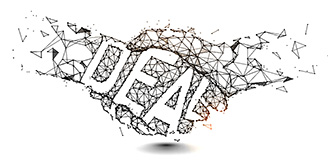Electronic Contracting Law in E-commerce
 Introduction to Contract Law
Introduction to Contract Law
A contract is a legally binding force between two entities, companies, or parties that link the parties in a contract protected by law. An agreement between the parties may be made orally, in writing, in action, or any of these ways.
A contract is an essential element of the law formed infinite times daily as people execute the typical activities of their lives. A contract is formed when one purchases groceries, uses public transport to work and accepts an employment offer.
Our lives are riddled with the contract, which may not necessarily always be written, but they can be oral too. There are a few elements that must be satisfied in order for a contract to gain legal effect.
To establish a contract, offer and acceptance must be derived through the mirror image rule; the terms of the acceptance must correspond precisely with that of the offer to be valid.
Treitel defines an offer as ‘an expression of willingness to contract on specified terms, made with the intention to be binding as soon as there is acceptance by the person to whom it is addressed.
H Beale defines an acceptance as ‘a final and unqualified expression of assent to the terms of the offer’.
An intention to create legal relations must be determined to distinguish an informal contract from one of legal status. It is presumed that in commercial agreements, this intention is a default setting.
Lastly, to agree contractually binding, it must be supported by sufficient consideration from the promisee. Consideration can be expounded through Pollock’s definition, ‘an act of forbearance or the promise thereof is the price for which the promise of the other is bought, and the promise thus given for value is enforceable.
When all these elements as set out above are incorporated into an agreement, a contract between the concerned parties may be sued upon and legally enforced.
Long gone are the days where a contract had to be a physical document. Technological advancements have allowed the development of contracts into an electronic form that is acted upon in an online domain.
Electronic Contracts
 Every day, thousands of commercial transactions occur via the Internet, with no face-to-face connection between the parties involved. Purchasing insurance, signing real estate contracts, using credit cards, and entering into financial agreements are just a few examples of computerized transactions.
Every day, thousands of commercial transactions occur via the Internet, with no face-to-face connection between the parties involved. Purchasing insurance, signing real estate contracts, using credit cards, and entering into financial agreements are just a few examples of computerized transactions.
Despite the prevalence of electronic transactions, many individuals are confused if electronic signatures (e-signatures) and electronic contracts (e-contracts) are secure, legitimate, and legal. However, the lack of both firms and customers means that e-contracts and e-signatures are generally secure and dependable means of doing business. However, the parties participating in e-contracts and e-signatures must take particular precautions to ensure the legality of their agreements.
An e-contract is a contract that is generated and "signed" electronically rather than on paper. A contract is an example of something you may type on your computer and send to a business colleague, and the business colleague responds with an electronic signature confirming approval.
An e-contract can also take the form of a "click to agree" contract, which is typically included with software downloads: Before proceeding with the purchase, the user must click on the "I agree" button on a page presenting the conditions of the software licensing.
In addition, making an online purchase entails the execution of an e-contract. Even if nothing is signed, the buyer agrees to pay the seller a specified sum in exchange for the seller's commitment to give the buyer a product.
There are some general exceptions to electronic contracts. For example, wills, documents relating to adoption, court orders, notices of cancellation of utility services, notices of default, a notice of termination of health insurance benefits, notices issuing a warning of health hazards of a product, documents permitting the transport of dangerous materials, etc. must be writing.
Electronic Signatures
An electronic signature, also known as an e-signature, can be unfolded as data that takes the form of electronic intelligence, which is then logically aligned with other data in a similar electronic form of intelligence used by a signatory to implement his or her signature.
Electronic signatures function quite like those made physically on paper. These e-signatures are also legally binding, with the added benefit of it being incredibly efficient and highly cost-effective.
Electronic signatures are used widely now in many different fields:
They are used in sales and marketing to facilitate the easy and swift closure of transactions that do not require the additional cost of transport and time but can be accomplished from the comfort of your home.
They are also used in the process of hiring employees. Offer holders and potential candidates can electronically provide their signatures to a hiring board or corporations that require an employment contract to be signed with highly confidential information.
Electronic signatures allow for the easy protection of this data alongside enabling companies to hire internationally with ease, not requiring the funding of travel costs of employees who may be working remotely unnecessarily and allowing for the effective saving of funds. It also allows employees from different parts of the globe to conduct their business efficiently and effectively.
Most importantly, electronic signatures are also used in law and legal documents. This form of signatures fuels the self-service division of the law. For example, certain digital documents like NDA or liability forms can be viewed and signed online, and this removes the burden of having to print it out, sign it, and then put it forward to the authority requesting or demanding it.
E-commerce
Electronic commerce, sometimes called e-commerce, is the buying and selling goods and services through electronic systems (such as the Internet and other computer networks).
Electronic money transfers, supply chain management, Internet marketing, online transaction processing, electronic data interchange (EDI), inventory management systems, automatic data collection systems, and other technologies are all used in e-commerce.
Electronic commerce can be regarded as the trading and transaction portion of online business. This has also now come to include the exchange of electronic data to complement business activities such as payment and finance.
Some examples of successful electronic commerce businesses are Amazon, Namshi, Noon, Shein, Ali Baba, etc.
Even if businesses are not entirely e-commerce, they may incorporate elements of it through retail websites like almost all stores and restaurants today, such as Zomato, H&M, etc.
Electronic Contract Law in E-commerce
The law that governs this domain in the United Arab Emirates is Federal Law Number (1) of 2006 on Electronic Commerce and Transactions and even incorporates international law governing e-commerce when national law is silent on the matter.
It is assumed that a secure e-signature is reliable, belongs to the person involved, and expressly endorses the electronic document linked to it. It is also assumed that a secure electronic document has not been altered since its production and is trustworthy. A contract is not less legitimate or legal because it includes one or more electronic interactions.
Electronic acceptance of partial or entire acceptance may be made to finalize contracts. Electronic equipment can establish an arrangement without human interaction (two or more information systems). According to the DETCL, such an arrangement is binding. The DETCL is the Department Concerning Electronic Transactions and Commerce.
Validity of an Electronic Contract in the UAE
The Electronic Transactions and Commerce Law Number 2 of 2002 was enacted to control electronic transactions, including e-contracts. Article 13 of Chapter III indicates that it is permissible for offer, acceptance, and intention to be carried out electronically for the contract to be legitimate (Article 13(1)). The legality of the contract in issue should not be susceptible to judicial review.
Evidence of Civil and Commercial Transactions Law No. 10 of 1992 regulates and administers evidence in the UAE. Section 17(1), added by Federal Law of October 9, 2006 (36) of 2006, expands the definition of an electronic signature. A regular sign, sign, or character is considered an electronic signature.
In addition, any transmission, reception, movement, or storage of signs, symbols, inscriptions, photographs, voices, or other information generated through information technology media shall be considered electronic documents (Section 2).
Note that electronic signatures need to have the same ethnicity as the definition contained in this Act (Section 3(1)) and that electronic documents and records (and scripts) need to have the same credibility as defined. Official and customary inscriptions and documents (Article 4 (2)).
Therefore, an electronic document cannot be rejected on the grounds that it is electronic. Rejection of such documents requires specific requirements to negate the validity of such documents. For example, the authenticity of the source; the reliability of the methods used to protect the information.
 Conclusion
Conclusion
Electronic contracts in the UAE are recognized under both UAE law and DIFC free zone legislation. As previously said, all contract is governed by three factors: occurrence, acceptance, and intent. Whether electronic or paper-based, a contract is regarded as legitimate and binding if the relevant legal criteria meet these three characteristics.
As a result, if parties reach an agreement and created an electronic contract by electronic communication, such contract will be deemed a genuine and enforceable agreement to which the parties must adhere. Overall, the field of e-commerce is expanding, and the legal system must evolve alongside it to manage existing uncertainty and tackle future problems.
 English
English
 عربي
عربي Русский
Русский 官话
官话 português
português
 Türk
Türk 










